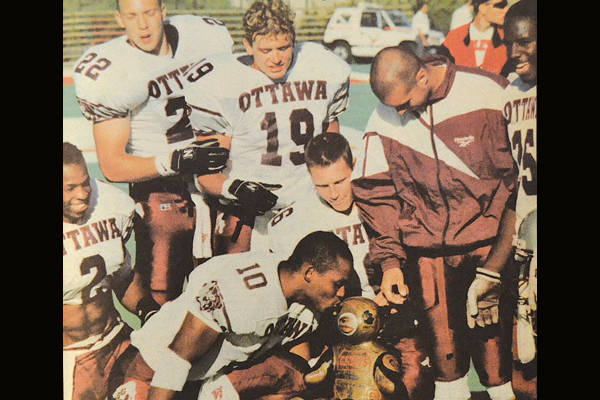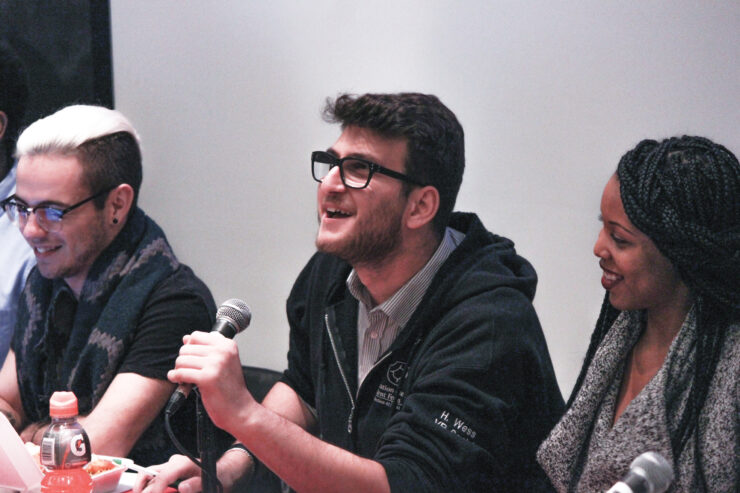U of O president discusses plans for 2017-18 academic year
On March 16 2017, the Fulcrum interviewed Jacques Frémont, president of the University of Ottawa, on his first year in the role. On Tuesday Oct. 31, in another exclusive interview, Frémont shared his aspirations for this year, addressing student satisfaction, the part-time professor strike negotiations, the progress of mental health services on campus, and the university’s budget restrictions.
The Fulcrum: What are your thoughts on the year so far? What has gone well, and what can be improved?
Jacques Frémont: Getting back to classes has been smooth in some respects; in other respects, I have some uneasiness about the level of support given to students. Certainly I hear left and right that there have been communication problems between the students and their faculties, or their departments concerning their courses. And actually, Fulcrum, you published a very good (feature) on that, the dossier was exactly, actually reflected what I’ve heard on campus, so I was pleasantly surprised, and it was a wake up call certainly for us.
We discussed that yesterday at the (Board of Governor’s meeting), you see, we’ve been fairly blunt about that, we do have a problem as pointed out in the Fulcrum. That was before the Maclean’s ranking, and the Maclean’s ranking was like the cherry on the sundae, it added the last coat of uneasiness. But as we said yesterday, there will be measures taken, we have to understand where it hurts and how we can get better.
So for me, la rentrée has been very much around these things; some anxiousness concerning drugs and fentanyl and the opioid crisis. We’re nervous about that, and we hear that there might be more drug consumption on campus, so there’s some uneasiness there, and certainly repeated concerns concerning mental health and the Indigenous files. Generally, we ought to do better.
So these (problems) are mostly what we’ve been working on since getting back to school.
F: You addressed the Maclean’s report. Just to build off of that, what exactly does the university plan on doing to improve the current discord between students and their various departments?
JF: Well my concern is not to, once again, study things forever. What we’ve announced yesterday is that there will be a committee, consisting of professors and students, which will work and identify very quickly the host of problems and how we can improve … so that in the longer term we’ll know what changes we have to bring to the system, so that we have an actual plan immediately.
I suspect that part of the problems might have a cultural basis, that is… we have to change the minds of the people who designed the system and who run the system. We have to be in a position where if you have an easy question, calling for an easy answer, that people get it in real time, so that the energy is kept for people who are in real trouble, or real complex files.
It’s a matter of really making a difference… it’s true we have huge systems, it’s a complex business, but if one student has a problem, then odds are that many students have the same problem. So we really have to listen and find the solutions—and I’m not saying that we will find all the solutions, and all the problems will be solved, but students should not have to wait for weeks before getting an answer for a real difficulty that they have.
F: How have mental health issues been progressing since last year?
JF: I believe there has been some progress, but let’s be realistic, the progress will never be fast enough. We work really to re-design the entry points to the system so that whoever knocks on the door, there’s someone to answer. And the resources that we had were split under different administrative responsibilities, they were not necessarily talking to each other, now they’re talking to each other. So people in need can be seen by one type of resource or another, there’s been a concertation between all these people. We are launching publicity campaigns so that people know what are the entry points, and the easy entry points.
F: Can you elaborate on the entry points with some examples of how students can seek help?
JF: My understanding is that they can go to (the Student Academic Success Service), they can go to the health services, they can go through their residences, and their student associations who can point them to the right resources.
It’s a bit like for the sexual violence policy, there’s not one entry point, there are many entry points, and what’s important is that if you knock on the door of one of the entry points, you will be taken over by the system. Now, of course the challenges are with the divergences. The challenge really is not only for the people who knock on the door, but it’s also for the education of professors, the education of staff. We’ve approached the unions, and so far they are perfectly willing to work with us in the community for mental health.
Where we’re going really is… what we’d like to develop is an integrated mental health policy and wellbeing approach on the campus. It’s all linked, if you exercise, you do sports, you will probably have fewer chances of being ill, it might help your mental health. So we have to look at it as a holistic approach, but that’s many years down the road. I’m not sure we have the sports facilities we deserve on our campus, for instance, and that the access is wide enough for the real needs of our community.
So these are all things we’re working slowly to progress, but concerning mental health, what’s important is the frontline and I think we’ve improved since last year, and I hope that next year I’ll be able to demonstrate how we’ve improved from this year. So we really have to collectively work on that challenge. But of course there are many thousands of students and staff … so it’s quite a lot of people, and there’s us, and there’s the normal provincial health system and the relationship between the two. So, it is a great concern, but we’re trying to push the system in the right direction.
F: With no rises in the amount of government grants to the university, what is the university doing to increase its revenue going forward?
JF: The revenue grants? They’re decreasing. Basically, what I’ve said again and again, is, for the last three years, transfer payments to the university have been frozen, and now with the new financing (plan) that’s been in place for a few months now, it’s guaranteed it will not increase. So we went from about 50 per cent of our cost per Ontario student (being) paid for by the (province), now we’re around 44 per cent. And at the same time our costs increase year after year, because we have 5,000 staff, we have 1,300 faculty members, because all the expenses, it goes up by three per cent per year, whatever we do.
Heating, salaries, collective agreements, raises… so that becomes more expensive. The only place we can get money is through tuition, and that’s where it hurts, because I know very well what the challenges are for students. I think with OSAP, the government has made a real effort to integrate and better support some students … but certainly in this university, it’s not a majority of our students.
And with international students it’s a different problem, because we do not get money from the province. Quite the contrary—for every international student, we pay money to the province. So it’s a situation where we rely on tuition from national and international students just to pay for the basic requirements we have.
I would be the first one, if I could give a break to the students, I would be quite happy. But we have to do something, because a few years ago (grants) were well above 50 per cent and now it’s 44 per cent and next year it will go down, so tuition will have to go up, and is that the society we want? … It’s not necessarily fair to students, certainly in some disciplines where the earning capacity eventually to pay off student loans will not be as good as other sectors.
There has been some conversation between the government and student associations at Queen’s Park, but in the end, with universities, it’s not just the University of Ottawa, we’re all stuck in the same situation … I hope it will be one of the issues in the next electoral campaign, is what is fair to students who are not otherwise covered by OSAP.
F: With the strike negotiations, are things where they need to be and if not, how can they get there?
JF: There was an agreement between Sunday and Monday. Part-time professors are very important members of the community and actually what’s interesting is that students don’t always distinguish between part-timers and full-time professors, and part-time lecturers really bring very important dimensions in their teaching. So it’s important that we’re all comfortable within the community, and if we had enough money it would be easier to solve many of these challenges. What’s important is that we settle and negotiate until the very end, we did and and we reached an agreement. Like all agreements, I guess no parties got exactly what they wanted, but what’s important is that we have an agreement for the next couple of years, which will give us time to reflect a little more about the status of part-timers.
F: Last year, the Student Federation of the University of Ottawa (SFUO) was accused of stealing bus passes and the U of O and the OC Transpo launched an investigation. Are you able to say what they found, or when a report will be released?
JF: I’m not aware that there was an investigation.
Néomie Duval (manager, media relations): The OC Transpo conducted an investigation, and we’re still waiting on their (report). They’re building a financial reconciliation essentially for 2016-17, and the report isn’t complete yet, so once they do complete their analysis they’ll be providing us with their guidelines and next steps.
F: Is there anything else that you would like students to know?
JF: I think the campus will change greatly after this year, in the spring we’ll have a learning centre which will be open to students… I think 2018 will be a great year for that. For me it’s very very important that the student experience improves. It is a major concern, I think we can do better. And I hope you’ll get back to me in the future, and ask me, “Are we doing better?”





